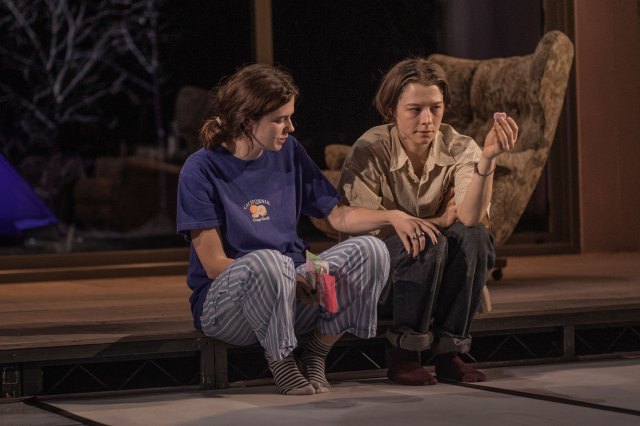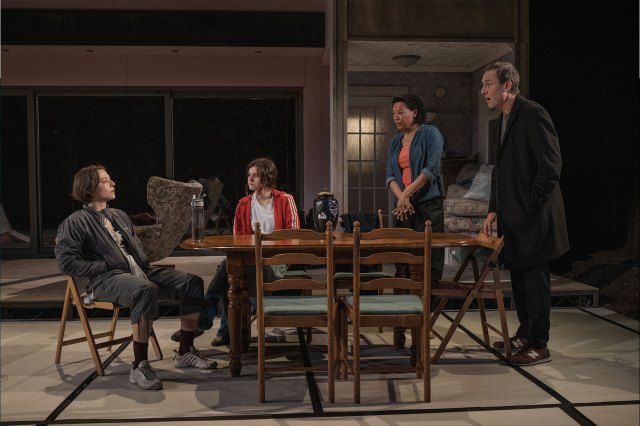The Other Place at the National Theatre review – Emma D’Arcy and Tobias Menzies in an astonishing take on Antigone
Alexander Zeldin’s new play runs until 9 November in the Lyttelton Theatre

There’s a lot of Greek suffering hovering over London at the moment, with Robert Icke’s version of Oedipus (with Mark Strong and Lesley Manville) about to open, and another Oedipus and an Elektra on the horizon. However good those productions are, they will have to be exceptional to match the sheer cathartic power of Alexander Zeldin’s very loose retelling of Antigone.
Grounded by two searing performances by Emma D’Arcy and Tobias Menzies, The Other Place does a simple thing in a sophisticated way. It asks why, 2,500 years after Sophocles first wrote a play about a young woman who defies her uncle in order to bury her brother with tragic consequences, the story still has such a universal resonance. The answer is that it deals with grief – and different ways of coping with a past that is tearing a family and a house apart.
Focusing on this, it dispenses with many of the complexities of Antigone’s plot, and presents us with Chris (Menzies), uncle to two sisters Annie (D’Arcy) and Issy (Alison Oliver), who has decided the time has come to bury the ashes of his brother, who killed himself in the home where he still lives and which he has just remodelled with his anxious-to-please new wife Erica (Nina Sosanya) and their laid back teenage son Leni (Lee Braithwaite).
He wants to make a new start, literally to bury the past. But Annie, returning from long absence, has other ideas; the ashes have to rest in this place so that their father’s memory is preserved, along with their sense of self. Chris’s deep-seated need to impose order on chaos collides with Annie’s equally fervent desire to cling to the life raft of the past.
As the play unfolds over a taut 90-minutes, it’s extraordinary how much tension Zeldin and his excellent cast generate. It’s not that the drama is not funny – there are brilliant comic interventions by Jerry Killick’s neighbour Terry, who fulfils some of the functions of a chorus. The dialogue is realistic, perfectly capturing the idiom of family life. And terrible, squirmy things happen to the ashes.
But Zeldin, who is best known for his intensely involving and naturalistic Inequalities Trilogy about the lives of the very poor, has been working on this drama for a year. The words have a real sense of jeopardy; they seem to spring from deep within, and as events take their course, they feel both inevitable and surprising. As taboos are broken and truths are revealed, they generate gasps of sympathy and shock.

This places the play in a liminal space – both utterly naturalistic and yet uncanny, unreal, just like a Greek tragedy. It’s a sense emphasised by Rosanna Vize’s superb kitchen set with a great expanse of window at the back – “like an aquarium,” says Annie, scornfully – and by James Farncombe’s lighting which sets a panel of light twisting overhead and makes Annie’s blue tent glow in the night.
Underpinned by Yannis Philippakis’s half-heard score, the setting creates a sense of foreboding, an otherness which holds a group of astonishingly observed performances. The entire cast are superb, with Oliver finding sadness and humour within Issy’s constant wish to please, Braithwaite making Leni both balanced and kindly and Sosanya modulating beautifully from tactless do-goodery to despair.
Each is dealing with their own tragedy, precipitated by the ungovernable relationships between Chris and Annie, that is slowly and painfully revealed. Menzies is towering as Chris, his constantly twitching hands displaying his anxiousness even when he is at his most urbane, his rocking on his feet conveying a man on the edge, desperately fighting for control and his sanity. He’s an actor of incredible stillness too; he doesn’t react, he simply seems to feel.
But he is matched in intensity by D’Arcy who makes Annie’s desire for justice, for poles to cling to in a frightening world, profoundly moving and empathetic. Their mutual pain becomes our pain, a resounding cry down the centuries, a vindication of theatre’s unique ability to make us feel.


















